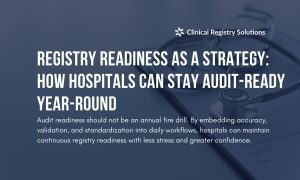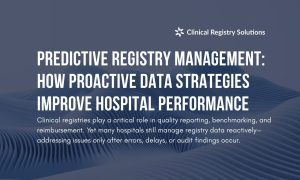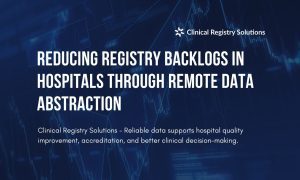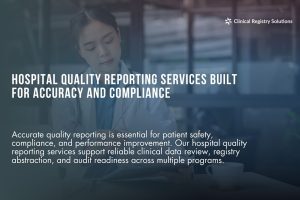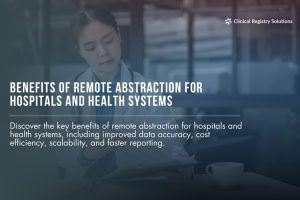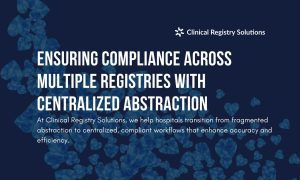If you’re running a hospital or health system, you know how important it is to stay compliant with quality standards. Did you know that Core Measures Abstraction Services can directly impact both patient outcomes and hospital reimbursements? Understanding and implementing these services is not just about ticking boxes; it’s about driving better care, reducing risks, and building trust.
They provide hospitals with the clarity needed to track performance more effectively. More importantly, they create a foundation for continuous improvement that benefits both staff and patients.
What Are Core Measures Abstraction Services?
It involves collecting, reviewing, and reporting hospital data to ensure compliance with CMS and The Joint Commission requirements. This process ensures that hospitals are not only meeting regulatory benchmarks but also improving patient outcomes in measurable ways.
Hospitals often face challenges like:
- Large volumes of data across departments
- Constantly changing regulatory requirements
- Staff limitations for manual abstraction
- Risk of reporting errors that affect reimbursements
This is where professional abstraction services come in, providing structured, accurate, and timely reporting that strengthens quality initiatives.
Why Hospitals Struggle Without Core Measures Abstraction
Without streamlined abstraction services, hospitals often face serious challenges that affect compliance, finances, and patient outcomes. Core measures abstraction isn’t just a reporting requirement, it’s a lifeline that keeps quality data accurate and actionable.
- Delays in reporting can result in penalties
When hospitals fall behind on abstraction deadlines, it can delay submissions to agencies like CMS or The Joint Commission. These delays often lead to financial penalties, missed incentives, and even risks to accreditation.
- Inaccurate data capture leading to compliance issues
If data abstraction is inconsistent or incomplete, the hospital’s quality reports won’t reflect actual performance. This not only triggers compliance red flags but can also give an inaccurate picture of care delivery, which hurts improvement initiatives.
- Overloaded staff who are pulled away from direct patient care
When nurses or clinical staff are tasked with manual abstraction, it takes valuable time away from patient care. Over time, this strain leads to staff burnout and inefficiency in both reporting and bedside responsibilities.
- Lower quality ratings that affect reputation and funding
Quality ratings influence how patients, insurers, and regulators view a hospital. Poor ratings can reduce reimbursements, harm the hospital’s public image, and limit opportunities for growth or partnerships.
By investing in expert label printer troubleshooting precision applied to clinical reporting, hospitals can avoid costly mistakes and maintain operational efficiency.
Key Benefits of Core Measures Abstraction Services
Professional abstraction services help hospitals:
- Improve compliance with CMS and The Joint Commission requirements
- Free up staff to focus on direct patient care
- Reduce risks of reporting errors
- Enhance hospital rankings and public trust
- Secure better reimbursement rates
These benefits go beyond compliance; they create a culture of accountability and better care delivery.
The Connection Between Abstraction and Hospital Performance
Think of Core Measures Abstraction Services as the backbone of hospital quality programs. Without them, it becomes difficult to track outcomes consistently or compare performance across different facilities. Hospitals that prioritize abstraction are better equipped to demonstrate quality results, meet pay-for-performance goals, and ensure ongoing improvement.
FAQs
1. What exactly are Core Measures Abstraction Services?
They are professional services that collect and review hospital quality data for compliance with CMS and The Joint Commission requirements.
2. Why do hospitals need these services?
They ensure compliance, reduce the burden on staff, and improve accuracy in quality reporting.
3. Can abstraction services impact hospital reimbursements?
Yes. Accurate and timely abstraction directly affects pay-for-performance programs and reimbursement rates.
4. How is Clinical Data Abstraction different from Core Measures Abstraction?
Core measures abstraction focuses on standardized sets like sepsis or stroke, while clinical data abstraction provides broader insights into hospital care processes and patient outcomes.
5. How does Hospital Quality Reporting benefit patients?
It improves transparency, builds trust, and assures patients that the hospital is delivering high-quality care.
How Clinical Data Abstraction Supports Hospitals
While core measures focus on standardized sets like sepsis, stroke, or surgical care, clinical data abstraction provides deeper insights into patient care processes and outcomes.
Benefits include:
- Identifying gaps in care pathways
This means analyzing patient records to uncover where care steps are missing or delayed. By spotting these gaps, hospitals can take action before they impact patient safety.
- Supporting hospital leadership with real-time dashboards
Dashboards powered by clinical data show trends as they happen. Leaders can make informed decisions quickly, without waiting for quarterly or yearly reviews.
- Guiding staff training based on measurable data
Clinical abstraction pinpoints areas where staff may need additional training. Hospitals can then design focused programs to improve skills and close performance gaps.
- Aligning with national benchmarks for continuous improvement
By comparing their data against national standards, hospitals can see exactly how they measure up. This drives long-term improvements and ensures compliance with regulatory expectations.
When combined with core measures abstraction, clinical data abstraction gives hospitals a complete quality picture.
The Role of Hospital Quality Reporting
Hospitals are increasingly judged on transparency. Hospital Quality Reporting allows organizations to showcase their performance to patients, payers, and regulators. Abstraction services play a vital role in ensuring that the data reported is accurate and timely.
Inaccurate reporting can:
- Jeopardize accreditation
- Impact funding
- Reduce patient trust
Accurate reporting strengthens credibility and demonstrates a hospital’s commitment to excellence.
Conclusion
Choosing to invest in Core Measures Abstraction Services is not just about meeting regulatory requirements; it is about building a foundation of quality care, better outcomes, and financial stability. For hospitals and health systems, abstraction services remove the burden of manual reporting and ensure data accuracy that drives decision-making.
If your hospital is ready to improve compliance, accuracy, and overall performance, partner with trusted experts like Clinical Registry Solutions to streamline your reporting and elevate your quality programs
